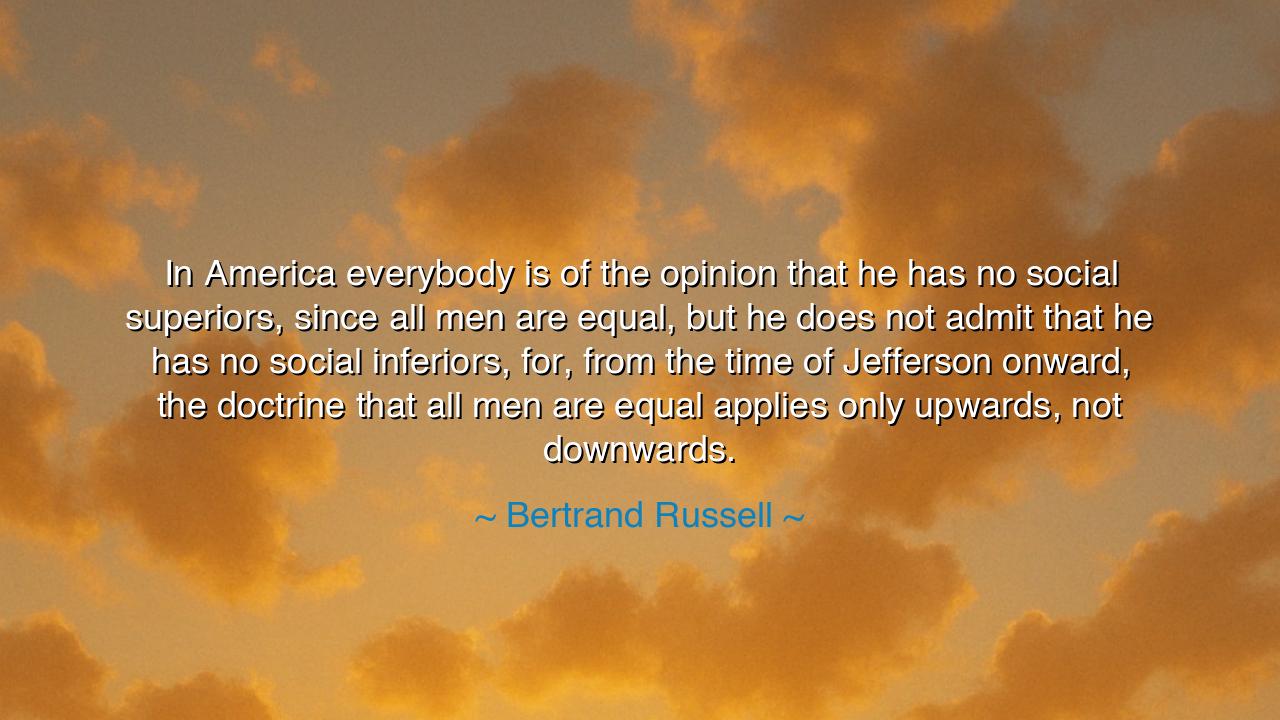
In America everybody is of the opinion that he has no social
In America everybody is of the opinion that he has no social superiors, since all men are equal, but he does not admit that he has no social inferiors, for, from the time of Jefferson onward, the doctrine that all men are equal applies only upwards, not downwards.






The words of Bertrand Russell—“In America everybody is of the opinion that he has no social superiors, since all men are equal, but he does not admit that he has no social inferiors, for, from the time of Jefferson onward, the doctrine that all men are equal applies only upwards, not downwards.”—cut like a blade of irony through the veil of democracy’s illusion. With this sentence, Russell, philosopher and critic of human hypocrisy, exposed the paradox at the heart of American society: that while equality is worshiped as a national creed, it is too often practiced as a privilege rather than a universal truth. His words, though spoken with the calm wit of a philosopher, burn with the heat of moral fire, for they reveal how the proud declaration that “all men are created equal” has been twisted by pride itself.
To grasp the origin of this quote, one must remember the world Russell inhabited. Writing in the early twentieth century, he observed America at a time of both triumph and tension—an age of industry, wealth, and new ideals, yet also of deep inequality. The doctrine of equality, first declared by Thomas Jefferson in the Declaration of Independence, was intended as a torch to light humanity’s path toward liberty and justice. Yet, as Russell saw it, the flame had been turned upward only—to burn away tyranny from above—but not downward, to illuminate compassion for those beneath. The American dream proclaimed that no man should bow to another, but too often failed to teach that no man should demand that others bow to him.
In these words lies a mirror to human nature itself. It is easy, Russell implies, to reject superiority when one is the subject of its weight—but far harder to reject the comfort of feeling superior to others. The proud citizen who will not kneel to a king may yet look down upon the laborer, the stranger, or the poor. Thus, the doctrine of equality, pure in its conception, becomes corrupted by ego. It is a noble truth confined by selfish hearts. What Jefferson intended as a universal law of dignity became, in practice, a ladder climbed by the ambitious—one rung higher, one hand on freedom, and one foot pressing down on another’s shoulder.
History offers many reflections of this duality. Consider the America of the Civil Rights Movement, more than a century after Jefferson’s pen declared equality. The people rose to demand that the sacred words of the nation be fulfilled, not merely for some, but for all. Yet the resistance they met revealed precisely what Russell described: many who claimed to love freedom believed it should shine only upward—to themselves—but not downward to those of another color or creed. The protests of Selma, the voices of Rosa Parks and Martin Luther King Jr., cried out to complete what the Founders had only begun—to make equality not a weapon of pride, but a covenant of justice.
Russell’s insight reaches beyond America, for it speaks of a universal failing of the human soul. In every land, people yearn to rise, to be seen, to be valued. But when they reach higher ground, too many forget to lift others beside them. The illusion of equality without empathy becomes a hollow creed, a flag waving in the wind without the roots of compassion to hold it firm. True equality is not merely a declaration of sameness; it is the practice of humility—the recognition that the measure of a just man is not how he resists the powerful, but how he treats the powerless.
In the spirit of the ancients, we may say that Russell’s words are a warning against hubris, the pride that blinds a people to their own contradictions. When a nation forgets that equality must flow in all directions—upward and downward, inward and outward—it begins to decay from within. The marble of democracy cracks not from external blows, but from the silent expansion of arrogance in the hearts of its citizens. The republic that honors freedom for itself while denying it to others has already begun to betray its founding faith.
The lesson is clear and eternal: equality is not achieved by declaration, but by discipline. It requires that each person see the divine spark in every other, regardless of station or circumstance. The farmer and the scholar, the ruler and the servant, the citizen and the immigrant—all stand alike beneath the same sun. To believe otherwise is to live in the shadow of hypocrisy. Therefore, let us examine our hearts daily and ask: Do I seek equality for all, or only for myself? Do I stand for justice, or merely for comfort?
So, my child, remember these words of Russell not as cynicism, but as a call to awakening. Equality under heaven cannot live in the laws of a nation unless it first lives in the hearts of its people. When you rise, lift another. When you speak, listen to those unheard. When you claim your rights, defend those denied theirs. Only then will the ancient promise of equality—spoken by Jefferson, tested by history, and warned by Russell—at last become whole. For only when equality flows both upward and downward will humanity finally stand side by side, not in pride, but in peace.






AAdministratorAdministrator
Welcome, honored guests. Please leave a comment, we will respond soon